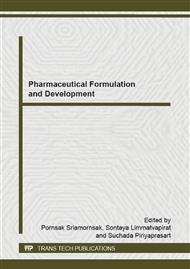p.3
p.7
p.12
p.17
p.21
p.25
p.29
p.33
Quaternized Chitosans as Gene Delivery Carriers: Effect of Degree of Quaternization
Abstract:
The objective of this study was to investigate the transfection efficiency of quaternized chitosan or trimethylated chitosans (TMCs) using the plasmid DNA encoding green fluorescent protein (pEGFP-C2) on human cervical carcinoma cell line (HeLa cells). The factors affecting the transfection efficiency, e.g. degree of quaternization (DQ) and polymer/DNA weight ratio were evaluated. The results revealed that the complexes of TMC30 with DNA had the highest transfection efficiency and safety followed by the complexes of TMC60 and TMC94, respectively. Increasing the DQ of chitosan not only improve the efficiency of gene delivery, but also increase cytotoxicity. In conclusion, TMC30 showed elevated potential as a gene carrier by efficient DNA condensation and mediated the highest level of gene transfection with negligible cytotoxicity in HeLa cells.
Info:
Periodical:
Pages:
17-20
DOI:
Citation:
Online since:
December 2014
Price:
Сopyright:
© 2015 Trans Tech Publications Ltd. All Rights Reserved
Share:
Citation:


